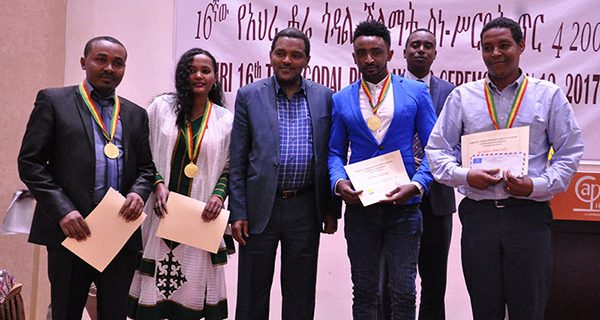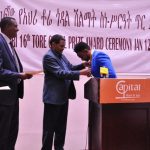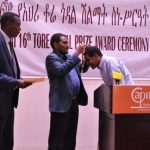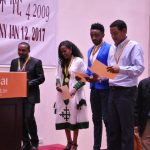Dr. Tore Godal is a Norwegian Scientist who some 45 years ago conducted research at AHRI, and also served as AHRI Director from 1970-1973. He later joined the WHO Special Program on Tropical Diseases Research and Training (TDR). In recognition of his work with TDR, he received in January 2000 the Prince Mahidol Award from Thailand. In November 2001, he wrote and told us that “since my international health career started at AHRI, I thought it would be appropriate to extend the benefit of the award to AHRI.” He thus donated the interest from his award as the annual Prize to young Ethiopian researchers who write papers on topics related to infectious diseases.
The 16th Tore Godal Prize Award ceremony was held at Capital Hotel and day spa on January 12, 2017. At this ceremony his Excellency, Dr. Kebede Worku, State Minister of Health; his Excellency Professor Afework Kassu, State Minister of Science and Technology; Dr. Jeffrey Hansen, CDC Director; Miriam Maluwa, UNAIDS Director; Sissel Idland, Counselor, Norwegian Embassy; Anneka Nordeen Jaywardina, Deputy Head of the Swedish Embassy and Head of Development Corporation; members of the diplomatic community; chairperson and members of the AHRI Scientific Advisory Board; Director General of AHRI, Dr. Taye Tolera; with other invited guests and all staff of the Armauer Hansen Research Institute were presented at the event.
The AHRI Tore Godal Prize committee every year provides the prize to deserving young scientists. A committee of 5 persons has been established to administer the award. Members of the committee have been drawn from the Addis Ababa University, the Ethiopian Medical Association, the Armauer Hansen Research Institute the A.L.E.R.T. hospital and other institutions within the country. The committee has established selection criteria including relevance, originality, methodology, data interpretation, effort and conditions of work. Several years ago, to reflect the increasing volume and scope of biomedical research now being performed in Ethiopia, the decision was made that future competitions be opened up to all aspects of biomedical research, including both laboratory and non-laboratory based research, as well as research with application to both infectious and non-infectious diseases. Accordingly, with each passing year, the numbers of applications have increased, and this year we received the most applications ever, with an increasing number of studies judged as very high quality by the committee and published in very high impact international journals. We would like to think that this reflects a general increase in both the quantity and quality of research being conducted nationwide in the country. Thus, this year has been the most selective of all the years, and because of this the committee decided unanimously to provide 4 awards this year rather than the usual three.
In addition, as you will see, the winners this year have received, performed their research and are currently positioned in diverse locations within the country. Winners receive a medal and a certificate backed by a 15000 birr cash award. In the spirit of Dr. Godal’s vision, it is the hope that this award will encourage the enhancement of excellent research being performed in the country.
The winners of the 16th Tore Godal Award are Beyene Moges Agizie, Metasebia Tegegn, Brook Tesfaye Tekle and Tadesse Alemu Zerfu.
Beyene Moges Agizie
Beyene received his MD degree from the University of Gondar in 2008. His undergraduate thesis in medical school addressed was entitled “Knowledge, attitude, and practice on Oral contraceptive pills among women of reproductive age group in Debark town, Northwest Ethiopia”. He subsequently became lecturer of Microbiology, Immunology and Parasitology first at the University of Mekele, and then the University of Gonder. He subsequently enrolled in the department of Virology at the University of Leipzig in Germany and received his PhD in 2016. He is presently Assistant professor of Microbiology, Immunology and Parasitology School of Biomedical and Laboratory Sciences at the University of Gondar.
There is a class of viruses called Flaviviruses which are commonly transmitted by bites from mosquitoes or other insects. The virus name comes from the latin word “Flavus” which means yellow, and one of the most common viruses in this class is Yellow Fever Virus, which without vaccination may cause a potentially fatal disease associated with jaundice or yellow skin, bleeding and multi-organ failure. There are several other important viruses in this class as well, including West Nile Virus and Dengue Virus, which can cause a range of presentations including mild or barely noticeable disease in some cases, but severe disease or even death in other cases. In addition to man, these flaviviruses often infect other animals, with blood sucking mosquitoes serving as the means or “vector” transmitting from one animal to another or to humans. The ultimate number of humans infected can thus depend very much on changing environmental and climatic conditions which in some years can lead to an overabundance of mosquitoes or animal hosts; thus, flavivirus diseases can be minimal some years, but in others be associated with unpredictable epidemics which heighten national and international public health fears.
One of the problems with flavirus infections is the lack of a simple diagnostic test appropriate for field conditions. Although there are no antiviral therapies which can kill such viruses, early diagnosis associated with aggressive supportive care such as provision of intravenous fluids can be life saving. Blood tests called serological tests are commonly used, but such tests often lack specificity. If positive, they may mistakenly diagnosis a given flavivirus species such as Yellow Fever for another one such as Dengue, or for another virus class altogether.
Beyene, using advanced molecular approaches developed reagents and ultimately tests which increased the specificy of Flavirus detection, improving substantially the overal test performance. Although still under development, such tests could easily be applied in rural field conditions and ultimately prove invaluable diagnostic tools for individuals infected with such viruses. We congradulate Beyene on his noveland exemplary achievement, wish him the best in his future endeavors, and proudly present him with one of the Annual Tore Godal award.
Metasebia Tegegn
Metasebia receive her BSC in Laboratory Technology from Haramaya University in 2007. She subsequently worked at ALERT hospital as laboratory technologist and in 2012 was promoted to assistant lab manager. She received her MSc in Lab Management from Addis Ababa University in 2016. She continues to work at ALERT as assistant lab manager.
Leukemia is a type of cancer which is due to uncontrolled growth of white cells within the blood. These cells are normally part of the immune system and used to fight infection. However, in some unfortunate individuals, and for incompletely understood reasons, such white cells begin to grow uncontrollably, and invariably result in a fatal disease: cancer. There are many therapies available which can in some cases cure disease or in other cases halt the leukemia for several years and extend life. However, many of these therapies are not available in the country for many reasons including their high cost, as well as the reluctance of donor agencies and pharmaceutical companies to provide the drugs without a high precision diagnosis. Leukemia, and their related malignancies lymphoma—which are similarly but localized not in the blood but in lymph node glands– together comprise more than 70 subtypes, and often different subtypes of leukemia have very different forms of therapy. The most common type of diagnosis is through simple microscopy, which is often sufficient, but in many cases unable to accurately diagnosis more precisely the given subtype of leukemia. Flow cytometry is another method which is widely used in Western countries, but rarely in resource limited countries such as Ethiopia. Flow cytometry is a technique which evaluates individual White cells and can easily characterize them on the basis of the pattern of molecules they express on the surface of the cell, a sort of “fingerprint” which is unique for each cell. Similarly, this same approach has proven very useful to diagnose multiple subtypes of leukemia which are beyond the capacity of standard microscopy approaches. Flow cytometry is the same method used to enumerate CD4 cells for patients with HIV disease and help doctors decide when to start anti-viral therapy. Because of the HIV epidemic there are many flow cytometers in the country which could also be used for leukemia diagnosis; however, leukemia diagnosis involves characterization of many more molecules and hence is more difficult to learn and apply.
In her study, Metasebia successfully performed flow cytometric analysis on a large number of leukemia patients, illustrating its feasibility in Ethiopia, and in so doing also was able to arrive at correct diagnoses in a number of cases which could not be so done using conventional microscopy, thus enabling doctors at Tikur Anbessa to provide a more appropriate therapy for such patients. This approach could be extended to multiple sites within the country, and as such presents an important step forward in the fight against cancer in this country. We congratulate Metasebia for her exemplary efforts, wish her the best in the future, and proudly present her with one of the 16th Annual Tore Godal prize awards.
Brook Tesfaye Tekle
Brook received his BSc from Adama Science and Technology University in Computer Science in 2011. He subsequently received a MPH degree in Medical Informatics from Gonder University Institute of Public Health in 2013. Since 2013 he has served in the Monitoring and Evaluation Case Team Policy and Planning Directorate in the Federal Ministry of Health here in Addis Ababa.
Much of the biomedical research done in Ethiopia; including that forming the basis of many of the Tore Godal awards in the past years have been given to researchers who have performed experiments in the laboratory. Such lab based approaches are vital ultimately in laying the groundwork for future lifesaving diagnoses and treatments, but a disadvantage is they often take many years to develop and/or implement. Operations research is a different type of research in which one starts with data already obtained by health care providers and program officers, and analyzes that data in different ways in order to come up with solutions to hypotheses that can lead to predictive methods to suggest immediate optimal management of patients or changes in overall program policies. There is increasing awareness that operations research forms a highly cost effective means to immediately improve health care delivery particularly in resource limited countries such as Ethiopia. Yet, such research is underperformed in the country, and there exists considerable valuable but underutilized clinical data both in traditional paper records of individual patients as well as in databases stored and accessed within computers.
Brook developed an advanced approach to extract or “mine” and analyze large amounts of data from within computer stored data files on patients. Such analysis lead to an internet based model which predicts the risk of child mortality in Ethiopia based a number of simple attributes including whether the child was or is breast-feeding, maternal and paternal education, preceding birth interval, whether the child a low birth weight, whether family planning services have been involved, and presence of diarrhea in the child. Thus for any given child, a health care work can access the internet and answer these simple questions—which in the model are provided in both written Amharic and English, and arrive at an accurate prediction of risk of mortality for that child. This simple approach can be utilized to identify high risk children, and alert health care workers and family that interventions may be required to ensure healthy survival. Furthermore, such an approach can be utilized in many others in other important areas of health care research to potentially improve public health in the country. We congratulate Brook for his exemplary efforts, wish him the best in the future, and proudly present him with one of the 16th Annual Tore Godal prize awards.
Tadesse Alemu Zerfu
Tadesse received his BSc degree in public health in 2003 from Alemaya University. He then worked as a health officer, ultimately head of the woreda health office in Gurage Zone, SNNRP until 2007. He then received a MPH in reproductive health from Jimma University in 2008. He then becomes a regional program coordinator in at the Family Guidance Association of Ethiopia, and subsequently, lecturer, research and vice Dean at Dilla University in SNNRP. He received his PhD in Food Science and Human Nutrition, from Addis Ababa University, Ethiopia in June of 2016, and is presently, Assistant professor of Food Science and Human Nutrition at Dilla University, in SNNPR, as well as a post doctoral fellow at the London School of Hygiene and Tropical Medicine.
It is well recognized that maternal and child under nutrition can lead to significant mortality, and that in particular adequate nutrition during pregnancy is associated with significant improvements in both maternal and child outcomes. Unfortunately, diets of mothers during pregnancy in resource limited countries are often inadequate, and despite recommendations of changes in diet as well as nutrient supplementation by the WHO, dietary changes are often not practiced and hence dietary needs remain inadequate. In his study, Tadesse utilized a simple alternative approach as a potential means to encourage mothers in the future to change their diets appropriately. He conducted a study in rural Arsi zone, and interviewed a large number of mothers at several times during their pregnancy to determine their usual dietary intake. He classified them into those with high and low dietary scores, and then evaluated pregnancy complications at term such as anemia—the presence of too low amounts of oxygen carrying blood—as well complication of newborns, such as low birth weight which is associated with higher risk of infant morbidity and mortality. He found that the mothers who had high score diets which included animal-source foods, fruits and vegetables had significantly fewer complications than those mothers with low score diets. Importantly, there were no differences in family income in the two groups, and interestingly, both groups had identical uptake of the minimal recommended folic and iron tablets and associated blood levels of these nutrients, suggesting that differences in outcomes were not related to these nutrients. This novel study, which was published in a prestigious international journal, offers a promising and powerful approach to encourage mothers to simply adapt practices used by other mothers of equivalent economic means in the same region in order to improve pregnancy outcomes and the livelihood of their children. We congratulate Tadesse for his exemplary efforts, wish him the best in the future, and proudly present him with one of the 16th Annual Tore Godal prize awards.




